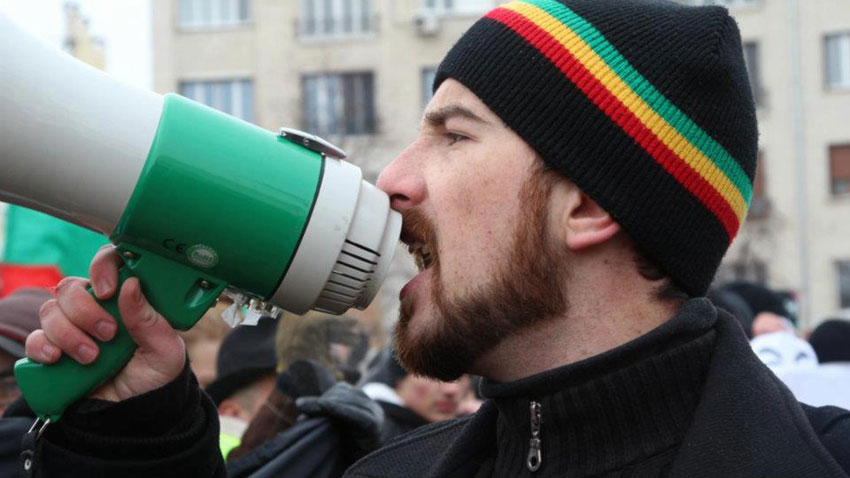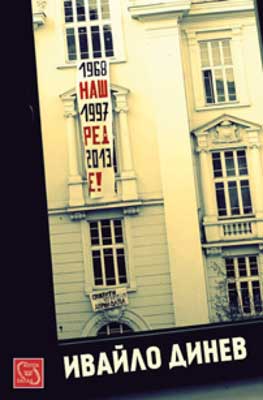“We believed that another world was possible and that we created our own, student republic, being able to offer not a political alternative, not another messiah, but something more – an alternative to life”. That is what Ivaylo Dinev, one of the leaders of the Sofia University’s occupation a year ago, writes in his newly released book. The occupation was a sort of a counterpoint to the unsuccessful street protests against the entire political class. That radical political act gave us reasons to talk on a political awakening of the Bulgarian youth, considered to be apathetic over the past years. Hence the nickname the protesters got from the street: the Early Rising students.
 “I think our act remained somehow misunderstood and explained within old categories: communism / anti-communism, leftist / rightist and not as something new and more different,” says the author, who is also an anthropologist and poet.
“I think our act remained somehow misunderstood and explained within old categories: communism / anti-communism, leftist / rightist and not as something new and more different,” says the author, who is also an anthropologist and poet.
The University occupation was the act of revolt of the transition period children, he adds. Many of us rallied against the reality after the end of communism in Bulgaria. Most of us have faced a difficult everyday life, with heavy diseases at home, unemployed parents or ones, working abroad. An environment of a deepening social injustice, totally different from the ideal for democracy, shouted out loud in the squares by our parents back in the days… The heroes of those days, when today’s 25-year-old ones were growing up were not fighters for real democracy, but the so-called mugs, people of physical strength, created by the political class for the collection and guarding of unfairly gained wealth.
“Our state was governed either by those with a political backup or by the ones, who used physical strength. Despite Bulgaria’s EU accession, the poor off remained poor and the better off got richer,” Ivaylo explains. “Corruption, seen everywhere, the mugs from the streets, created in the 1990s, outrage us. Only slyboots make it here, but not intelligent, hard-working people. I see these years as the second kardjalia period in Bulgaria /kardjalii were organized brigands from the Ottoman rule back in the 18 – 19 c./. Bulgarians and Turks united then and build fortified villages, in order to protect their settlements. Our reaction was similar a year ago. Our revolt was aimed at the transition and the heroes of transition, against the parties that had ruled over the last 25 years.”
Young people, students, should be that immune system within the public body, which prevents the incipient tumor, Ivaylo is convinced.
“Our generation was united for the first time by a cause and it was an emotional cause, not ideological” Ivaylo further points out. “We had to get over ideologies, separations and to start talking of common human things, on things that are above it all. Yes, our revolt was idealistic, its goals were tough and too high up in the sky. However, we can’t change the world by simply saying: “This can’t be done” – it will never be changed like that. Yes, an occupation is not enough, we can’t change the world at once. But this is an event that can make ours revolutionary values, such as solidarity, freedom, responsibility – those can be turned into projects for the future.”
 Ivaylo Dinev tries to reconsider in his book what happened, viewing events in the context of similar student sit-ins in 1968, 1997 or the Arab Spring. The author says that the several months of occupation helped the students gain precious experience, growing as citizens. One of the models that it can give to society is the one for the strive for direct democracy.
Ivaylo Dinev tries to reconsider in his book what happened, viewing events in the context of similar student sit-ins in 1968, 1997 or the Arab Spring. The author says that the several months of occupation helped the students gain precious experience, growing as citizens. One of the models that it can give to society is the one for the strive for direct democracy.
“I think the occupation was a local example for a revolutionary institution that can be used as a project for the future,” Ivaylo says. “Every one of us had the right to propose, to discuss, to vote. Sometimes we had 14-hour-long sittings and finally we took a decision that was totally legitimate. My experience was that direct democracy was not that risky and that people involved in it grew as citizens day after day, slowly and gradually. That is why I think that if referendums take place more often in Bulgaria, along with other forms of direct participation of the majority in the decision-making process, we will get the awareness we need to develop faster as a nation.”
The mistake from last autumn that counters for the entire protest was that no way was found for the involving of the majority of Bulgarian citizens. The danger lies in the fact that people might lose faith once again in the protests’ effectiveness, as the same heroes and parties from the past entered parliament afterwards. The protests led to no political alternative, but achieved at least the small goal – to be a moral corrective of politics. Now each and every one, who wants to rule here knows that people might get out in the streets and make him resign in case he or she abuses their public trust.
“Our goal is revolutionary, but our steps should be evolutionary,” says the author of It’s Our Turn. “The most important of those steps is the building of a new political culture within Bulgarians via suitable education. That is where Ivaylo sees the participation of those, involved in the occupation last year. The experience gained should be used at the educational system for the forming of the new generations."
English version: Zhivko Stanchev
The Spring Edition of the Plovdiv Fair of Crafts has opened in the Old Town, reports BNR-Plovdiv. For three days, until May 19, craftsmen will be demonstrating their skills with the focus this year laying on a craft with almost 5,000 years of..
The conference "The work of Swiss teachers - a message and a challenge for future generations" was held today . It was organised by the National Sports Academy "Vasil Levski" and the Swiss Embassy and is dedicated to the 130th anniversary of the arrival..
Interest in the academic study of the Bulgarian language in Slovakia dates back almost a century. The Comenius University in Bratislava was founded in 1919. Two years later the Faculty of Philosophy was established, where all humanistic subjects are..
For 30 years two Bulgarian universities have been offering high-quality technical and engineering education, in French, degrees and diplomas that are..
Under the title "Fashion Through the Looking Glass of a Century: From the Mid-19th Century to the Mid-20th Century', the Archives State Agency is..
Interest in the academic study of the Bulgarian language in Slovakia dates back almost a century. The Comenius University in Bratislava was founded in..

+359 2 9336 661
